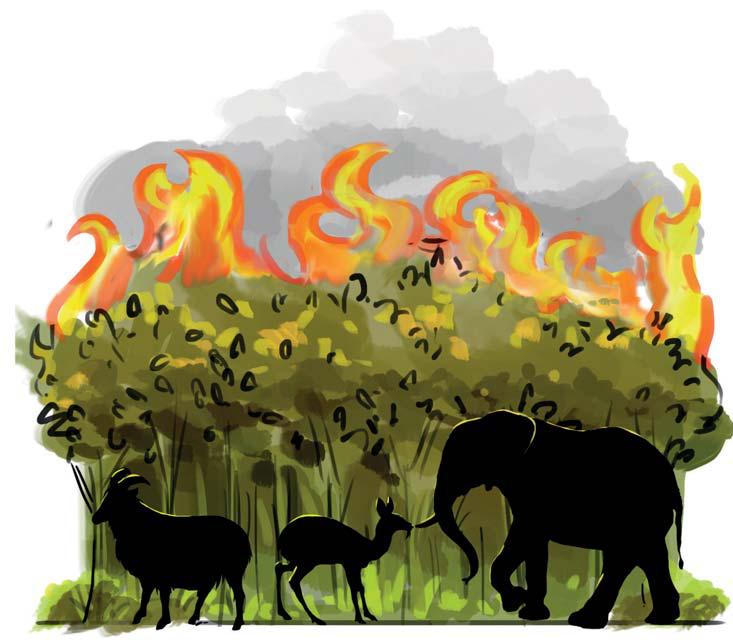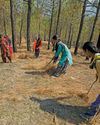
FOREST FIRES are becoming more frequent and fierce in Uttarakhand. Such regular burnings can be catastrophic for the state as well as the rich biodiversity it harbours. Uttarakhand is home to at least 102 species of mammals, 70 reptiles, 19 amphibians, and 124 species of fish. The state also boasts of 600 species of birds. The International Union for Conservation of Nature (IUCN) classifies 55 of the bird species as "threatened", of which six are critically endangered and four are endangered. Several mammalian fauna found in the state are also classified as endangered. The list includes the Asian elephant, tiger, Alpine musk deer, Himalayan musk deer, leopard, snow leopard, blue sheep, Himalayan Thar, leopard cat, Himalayan black bear, sloth bear and pangolin. With 7,000 species of plants, Uttarakhand contributes 31 per cent of the country's floral diversity. As many as 119 flowering plants are endemic to the state. The impact of recurrent forest fires in Uttarakhand is therefore not limited to the direct loss of trees and wildlife, their displacement and subsequent colonisation of unwanted species.
Forest fires can meddle with the life cycle of species and push many of the threatened and endemic species closer to extinction.
For instance, by destroying the leaves and foliage, a forest fire can significantly reduce the photosynthetic activity of surviving trees and thereby affect their growth. It can also damage the seed bank, both above and below the ground, and wipe out the seedlings and saplings growing on the forest floor. Species that are sparsely distributed and have small or patchy populations suffer the worst impacts as they lose their habitat, territories, shelter and food. The loss of keystone organisms in forest ecosystems, such as invertebrates, pollinators, and decomposers, can significantly slow the recovery rate of the forest.
Denne historien er fra April 16, 2023-utgaven av Down To Earth.
Start din 7-dagers gratis prøveperiode på Magzter GOLD for å få tilgang til tusenvis av utvalgte premiumhistorier og 9000+ magasiner og aviser.
Allerede abonnent ? Logg på
Denne historien er fra April 16, 2023-utgaven av Down To Earth.
Start din 7-dagers gratis prøveperiode på Magzter GOLD for å få tilgang til tusenvis av utvalgte premiumhistorier og 9000+ magasiner og aviser.
Allerede abonnent? Logg på

THE CIRCULARITY ARGUMENT
A circular economy can help India achieve its developmental aspirations while following the low-carbon pathway. It will also help address the challenges of waste management, pollution and overexploitation of natural resources. Industries are already innovating to reuse high-volume wastes and have shown that the transition can usher in both environmental and financial windfalls

Banking on flawed drug voluntary licences
The Medicines Patent Pool is pushing for more VLs, but its bad deal with Novartis on a cancer drug shows the pitfalls

Lasting solutions
For the first time, the UN has recognised the role of indigenous communities in tackling aridity. A repository of traditional knowledge India has the wherewithal to lead the way

IMD at 150
India's journey into modern weather forecasting took a decisive turn 150 years ago with the establishment of India Meteorological Department during the British rule. The agency has come a long way since then, shaping the way the country predicts and responds to its diverse climate challenges

Every drop counts
In drought-prone Marathwada region, 14 villages have managed to counter water shortage by budgeting the resource

Threat to survival
Hollongapar Gibbon Sanctuary in Assam faces ecological challenges as railway electrification and hydrocarbon exploration endanger its fragile biodiversity

'Migration is going to be a battlefield'
AMITAV GHOSH is one of the foremost chroniclers of our times. His literary sojourn includes writings on topics that range from languages to climate change to human lives. His latest book, Wild Fictions, brings some of his works on these issues under one title. In a conversation with RAJAT GHAI, Ghosh shares his views on the future of human movement. Excerpts:

Face of future
California wildfires confirm forest fires are intensifying in a hotter world, emitting substantial amounts of greenhouse gases and reinforcing global warming

Friends of the forest
Residents of 30 villages in Uttarakhand establish a model for public participation in saving forests from wildfires

Climate-crazy playbook
Just hours after his second (and final) term began on January 20, US President Donald Trump unleashed 46 presidential actions. Several of these are centred on the US' climate commitments, energy transition, migration and trade policies, and are likely to have negative global implications